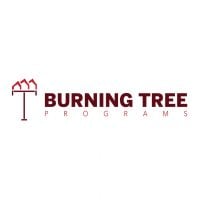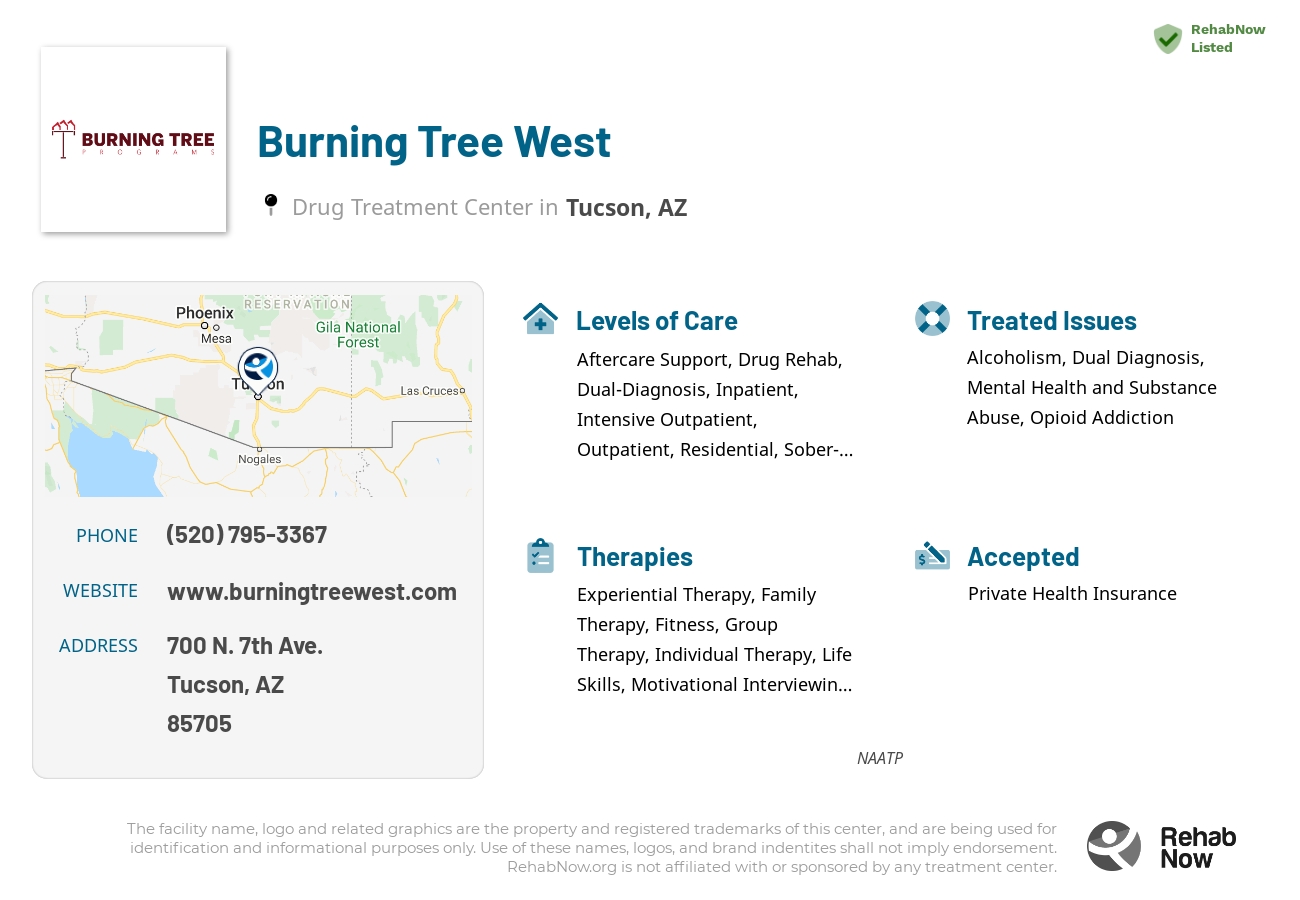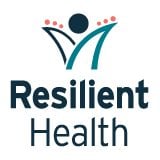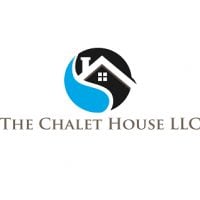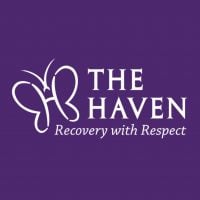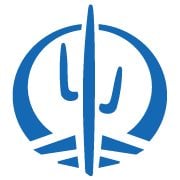Burning Tree West
Drug Rehab Center in Tucson, Arizona
Burning Tree West is an accredited Addiction Treatment Facility in Tucson, AZ offering a variety of treatment plans tailored to individual needs including dual-diagnosis treatments, residential and inpatient care, and sober-living services with a capacity of 16 beds that accept private health insurance.
About Burning Tree West in Arizona
Burning Tree West is positioned in the vibrant city of Tucson, Arizona, and is dedicated to aiding young adults battling substance addiction. This facility is unique for its emphasis on personal and professional growth, intertwining academic pursuits with the recovery process. It operates on core values of accountability, responsibility, and consistency and offers 16 beds to ensure a focused and supportive environment.
Accredited by NAATP, LegitScript, and JCAHO, Burning Tree West promises a high standard of care for its inpatient services. The program stands out for incorporating a strong academic component alongside the 12-step recovery process, facilitated by a dedicated staff member acting as a sponsor for each client.
- Offers a blend of academic learning and recovery principles, aiding in both personal and professional growth.
- Emphasizes the 12-step recovery process with personalized support from qualified staff sponsors.
- Provides comprehensive care with a variety of therapies including CBT, DBT, and trauma-informed therapy, tailored to individual needs.
Burning Tree West addresses substance addiction, alcoholism, and dual diagnoses with a multifaceted treatment approach. Utilizing evidence-based therapies such as cognitive behavioral therapy, dialectical behavior therapy, and 12-step facilitation, the facility offers an extensive range of care levels including intensive outpatient, residential inpatient, and aftercare support to help clients achieve and maintain sobriety.
Genders
Ages
Modality
Additional
Accreditations
NAATP

LegitScript

JCAHO
Conditions and Issues Treated
Many people need to recover from substance abuse to live a healthy life. In the end, if you can get through all the steps: detoxifying your body, rehabilitation after some time or when needed (depending on the type), and recovery while also receiving therapy support throughout the process, it can be worth it.
A detoxification center is a common place to start the recovery process from substance abuse. With your body and mind restored, you can continue to heal without the lingering effects of drugs.
Many people who struggle with opioid addiction need to attend specific programs like methadone , Suboxone or Vivitrol clinics.
These types of programs will provide the patient with legal, prescription medications that can help them overcome their cravings for illegal opioids like heroin or fentanyl . If the patient has a chronic condition like Hepatitis C, they must undergo treatment before they can begin taking these medications.
Dual Diagnosis is a specific relationship between two or more disorders that have the same symptoms and can sometimes be treated together. This is used in the treatment planning process when dealing with drug addicts. Dual diagnosis can be viewed as a chronic medical condition that has comorbid psychiatric disorders.
Although addiction and a mental illness may have separate symptoms that are not easy to detect, they often go hand in hand. Many times, drug abuse is a direct result of the mental illness. In other words, treating the addiction will not resolve all of your issues. Unless you also treat the underlying mental illness, you will not be successful in achieving sobriety.
Levels of Care Offered
This center offers a variety of custom treatment tailored to individual recovery. Currently available are Aftercare Support, Dual-Diagnosis, Inpatient, Intensive Outpatient, Outpatient, Residential, Sober-Living / Half-Way, with additional therapies available as listed below.
Inpatient treatment is an intensive program that takes place when a patient checks into a rehabilitation facility. The treatment includes detoxification and counseling sessions, which are round the clock. Outpatient treatments are also available, but inpatient care is advised as the first step of rehabilitation.
Intensive rehab ensures the patient stays in a substance-free atmosphere, improving treatment success rates. The patient participates in group therapy for motivation from other patients who have overcome addiction. Family members are also involved in providing emotional support throughout the program.
An intensive outpatient program is usually the first phase of addiction treatment. It provides relief for those who are addicted, but are not ready to commit to an inpatient setting. Typically, the patient lives at home and is able to work or go to school. IOPs consist of a daily 3 to 5-hour program, and there is a required number of hours per week. Most patients go to IOP between 20 and 40 hours per week. The patient attends group counseling and individual therapy throughout the duration of treatment. They also meet daily with their therapist to discuss how it’s going and where they are in the recovery process.
The goal here is to teach patients healthy coping skills, such as stress management and identifying thoughts and behaviors that lead to relapse. The implementation of these skills will be useful as the individual transitions into the next phases of treatment.
An outpatient treatment program is set up to help with alcohol or drug addiction, or a co-occurring disorder. The patient must attend the Arizona facility for their therapy and other programs but are able to return home each night. The frequency of mandatory attendance decreases after much of Burning Tree West‘s program is complete.
Sober Living Homes are an option for those who have completed a treatment program within the past several months. However, it isn’t advisable to use this as a permanent living arrangement because it can lead to a relapse .
The goal of a sober living home is to provide a supportive environment for recovering addicts so they don’t need to return to their previous lifestyles. The homes will not accept residents who are still using drugs or alcohol, and those living in the house must follow a set of rules dictating how they should behave to avoid relapsing.
Residential treatment programs are those that offer housing and meals in addition to substance abuse treatment. Rehab facilities that offer residential treatment allow patients to focus solely on recovery, in an environment totally separate from their lives. Some rehab centers specialize in short-term residential treatment (a few days to a week or two), while others solely provide treatment on a long-term basis (several weeks to months). Some offer both, and tailor treatment to the patient’s individual requirements.
Aftercare is a term that’s used to refer to any sort of continuing care offered for a drug addict who has voluntarily entered a rehabilitation program. This type of care can be provided in several settings, including outpatient therapy sessions after the addict has completed an inpatient program. There are also 12-step support groups, such as Alcoholics Anonymous, which can provide additional help for addicts trying to stay sober.
Therapies & Programs
Individual Therapy is a critical component of addiction recovery. Therapists work with patients to identify the root of their addiction and figure out how to better handle the issues that led to them using drugs. Individual Therapy is the one-on-one session where people meet with their therapist. Individual therapy provides a safe space for people to open up and discuss personal and sensitive topics which they may not feel comfortable discussing in a group setting.
Family therapy will also help families realize that the addiction is not their fault. For many years, people blamed themselves for an addict’s behavior and felt that they had done something wrong. This is not the case. Addiction is a disease, and it can strike anyone, even if their life seems fine from the outside. It can bring a lot of shame to a family when they have an addict in their midst, but if everyone is open and honest with each other, then they can help everyone stay in recovery.
Group Therapy is utilized by drug treatment centers like Burning Tree West to provide the recovering drug addict with a platform to talk about their feelings and experiences. It also provides for an opportunity to learn from other addicts who have successfully overcome their addiction.
Group Therapy is employed in lectures, seminars, or discussion groups (the latter two are typically conducted as “therapy groups”). It is recommended that all group members be recovering addicts for this type of therapy to work (though it does not exclude others with lived experience).
Dialectical Behavior Therapy (DBT) is used by drug treatment centers across the United States to help drug addicts become sober. DBT combines traditional behavioral treatments with elements from DBT, including dialectics, distress tolerance, and interlocking issues. It is commonly used to treat Borderline Personality Disorder (BPD) along with substance abuse disorders. The four DBT modules are mindfulness, interpersonal effectiveness, emotion regulation, and distress tolerance.
Eye Movement Desensitization and Reprocessing (EMDR) is a treatment that helps people recovering from drug abuse. EMDR has been proven to be more effective than traditional treatments for treating patients with addiction; it tackles the root of the problem. The rapid eye movements during EMDR sessions reduce the patient’s negative feelings related to past trauma, promoting calmness and relaxation. This, in turn, reduces the chances of relapse at a later stage.
Training in improved life skills helps those recovering from addiction feel more capable of self-care. Burning Tree West are daily skills that give the person the tools they need to survive.
The therapy covers practical activities like cooking, job hunting, social interaction, and money management, helping to fill in the knowledge gaps caused by addiction.
These life skills help the person self-manage their recovery and stay on track. It also reduces relapse risk as they gain confidence in their day-to-day abilities.
12-Step Program is used by drug treatment centers to get addicts sober. The 12 steps typically begin with addicts admitting they need help. They will work through physical withdrawal symptoms, identify the problems that led to their addiction and learn how to resist cravings. It is often used as a part of an inpatient or outpatient treatment program and is frequently recommended by doctors.
Nutrition therapy has been used to help drug addicts for decades. Many early reports on addiction treatment indicate that some patients recovered from the “satisfying power of food”. For years, this phenomenon has been utilized as a treatment modality in eating disorders for adults, adolescents, and children. Specific nutrients have been identified that influence neurotransmitters associated with reward pathways of the brain.
Studies have shown that carbohydrate loading with complex carbohydrates to elevate serotonin levels was effective in treating bulimia nervosa. This approach prompted researchers to explore the use of this type of nutritional intervention in other disorders.
Nicotine replacement therapy treats nicotine addiction using external sources of nicotine, such as patches or gum to substitute for nicotine. This allows people trying to quit smoking to get their desired dose of nicotine without actually having to smoke cigarettes. The idea behind NRT is that by providing smokers with nicotine in forms that are not cigarettes, they may be more likely to quit smoking.
NRT has been available for many years now, and there is a wealth of evidence that shows that it helps people trying to quit smoking. There are several different types of NRT devices on the market now. Patients interested in quitting smoking should talk to their doctors about the best kind of NRT for them.
Patient Experience
Experiential Therapy at Burning Tree West
Experiential therapy is another form of treatment that helps addicts overcome their addiction. This type of service typically involves hands-on activities with the focus on physical experiences instead of emotions or beliefs.
Some examples include art therapy, equine therapy and music therapy. Each of these forms of experiential therapy can provide unique ways for addicts to channel their feelings and work through their demons. This type of therapy also allows addicts to develop meaningful emotional connections with others, which can prevent them from resorting to relapse as a coping mechanism.
Equine Therapy in Arizona
Equine Therapy is offered by drug rehabs to treat a variety of addictions. A significant part of drug rehab centers that offer Equine Therapy is the farmer’s market effect it provides for patients by caring for and riding horses. The overall goal of Equine therapy is to encourage patients to have hope that they can overcome the challenges they are faced with.
Researchers have found that humans can build trust in each other when they work together with horses. Patients do this by learning how to communicate with the horse through body language to create a bond with it. This process takes time, but eventually, one can understand the horse’s different movements and how they affect the situation.
Fitness Therapy
Fitness therapy is an alternative treatment for drug addiction. Fitness therapists work with addiction counselors to help drug addicts recover from their addictions by incorporating physical fitness into their treatment. Fitness therapy uses both group exercise and individual physical activity to help addicts stay fit while getting sober.
Exercise releases endorphins in the brain, which are “feel-good” chemicals that reduce pain and increase feelings of happiness. Fitness therapy aims to help addicts stay sober by associating exercise with those good feelings. By helping addicts become active, fitness therapy also helps them gain self-esteem and lose weight.
Payment Options Accepted
For specific insurance or payment methods please contact us.
Is your insurance accepted?
Ask an expert, call (888) 674-0062
Additional Details
Specifics, location, and helpful extra information.
Tucson, Arizona 85705 Phone Number(520) 795-3367 Meta DetailsUpdated April 15, 2024
Staff Verified
Is Burning Tree West a LegitScript Verified Treatment Facility?
According to our most recent records, we have found this center to be LegitScript verified.
Burning Tree West Patient Reviews
There are no reviews yet. Be the first one to write one.
Tucson, Arizona Addiction Information
Arizona has some of the highest rates of prescription drug abuse in the United States. Methamphetamines, heroin and morphine are among the most commonly abused substances. Prescription pain relievers were prescribed to 348 million people in 2012, enough to medicate every adult in Arizona for 2 full weeks. The number of people with substance use disorders in Arizona has remained relatively constant over the past few years.
In Tucson, Arizona, drug addiction is a serious issue. In fact, according to recent statistics, there are over 15,000 people in the city who are addicted to drugs. This accounts for about 5% of the population. Tucson's most commonly abused drugs include heroin, methamphetamine, and cocaine. In Tucson, Arizona, the types of treatment available include inpatient rehabilitation, outpatient rehabilitation, and 12-step programs.
Treatment in Nearby Cities
- Clifton, AZ (112.8 mi.)
- Rimrock, AZ (173.2 mi.)
- Douglas, AZ (103.8 mi.)
- Mayer, AZ (166.8 mi.)
- Casa Grande, AZ (66.4 mi.)
Centers near Burning Tree West
The facility name, logo and brand are the property and registered trademarks of Burning Tree West, and are being used for identification and informational purposes only. Use of these names, logos and brands shall not imply endorsement. RehabNow.org is not affiliated with or sponsored by Burning Tree West.
